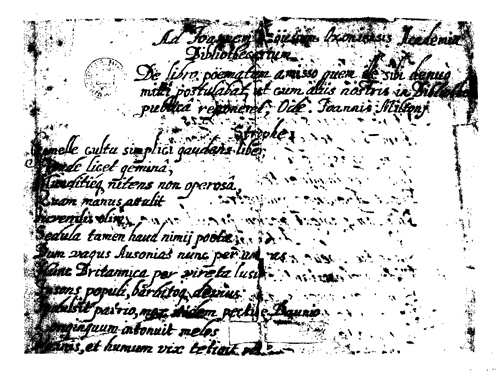A
letter he wrote in 1638 to John Milton.
When John Milton
was going to visit Italy in the 1630s, Sir Henry Wootton, who had been
ambassador to Venice, told him his motto should be 'i pensieri stretti
& il viso sciolto' transcribed as 'closed thoughts and an open face'.
Wootton added 'smile at everyone, and don't tell them what you're thinking.' |
|
The Copy of a
Letter Writt'n |
| |
|
|
|
|
| |
|
By Sir Henry
Wootton, |
| |
|
|
|
|
| |
|
|
To the Author,
upon the |
| |
|
|
|
|
| |
|
|
|
following Poem |
| |
|
|
|
|
| |
|
From the Colledge,
this 13. of April, 1638. |
| |
|
|
|
|
| |
|
| |
|
Sir,
It was a special favour, when you lately bestowed
upon me here, the first taste of your acquaintance, though no longer then
to make me know that I wanted more time to value it, and to enjoy it rightly;
and in truth, if I could then have imagined your farther stay in these
parts, which I understood afterwards by Mr. H., I would have been bold
in our vulgar phrase to mend my draught (for you left me with an extreme
thirst) and to have begged your conversation again, joyntly with your
said learned Friend, at a poor meal or two, that we might have banded
together som good Authors of the antient time: Among which, I observed
you to have been familiar. |
| |
|
|
| |
|
|
Since your
going, you have charg'd me with new Obligations, both for a very kind |
| |
|
Letter from you
dated the sixth of this Month, and for a dainty peece of entertainment which
came therwith. Wherin I should much commend the Tragical part, if the Lyrical
did not ravish me with a certain Dorique delicacy in your Songs and Odes,
wherunto I must plainly confess to have seen yet nothing parallel in our
Language: Ipsa mollities. But I must not omit to tell you, that I now onely
owe you thanks for intimating unto me (how modestly soever) the true Artificer.
For the work it self, I had view'd som good while before, with singular
delight, having receiv'd it from our common Friend Mr. R. in the very close
of the late R's Poems, Printed at Oxford, wherunto it was added (as I now
suppose) that the Accessory might help out the Principal, according to the
Art of Stationers, and to leave the Reader Con la bocca dolce. |
| |
|
|
| |
|
|
Now Sir,
concerning your travels, wherin I may chalenge a little more priviledge |
| |
|
of Discours with
you; I suppose you will not blanch Paris in your way; therfore I have been
bold to trouble you with a few lines to Mr. M. B. whom you shall easily
find attending the young Lord S. as his Governour, and you may surely receive
from him good directions for the shaping of your farther journey into Italy,
where he did reside by my choice som time for the King, after my own recess
from Venice. |
| |
|
|
| |
|
|
I should
think that your best Line will be thorow the whole length of France to |
| |
|
Marseilles, and
thence by Sea to Genoa, whence the passage into Tuscany is as Diurnal as
a Graveshend Barge: I hasten as you do to Florence, or Siena, the rather
to tell you a short story from the interest you have given me in your safety. |
| |
|
|
| |
|
|
At Siena
I was tabled in the House of one Alberto Scipioni an old Roman |
| |
|
Courtier in
dangerous times, having bin Steward to the Duca di Pagiano, who with all
his Family were strangled, save this onely man that escap'd by foresight
of the Tempest: With him I had often much chat of those affairs; Into which
he often took pleasure to look back from his Native Harbour; and at my departure
toward Rome (which had been the center of his experience) I had wonn confidence
enough to beg his advice, how I might carry my self securely there, without
offence of others, or of mine own conscience. Signor Arrigo mio (sayes he)
I pensieri stretti, & il viso sciolto will go safely over the whole
World: Of which Delphian Oracle (for so I have found it) your judgement
doth need no commentary; and therfore (Sir) I will commit you with it to
the best of all securities, Gods dear love, remaining |
| |
|
|
| |
|
|
Your Friend as
much at command |
| |
|
|
|
as any of longer
date |
| |
|
|
|
|
Henry Wootton. |

